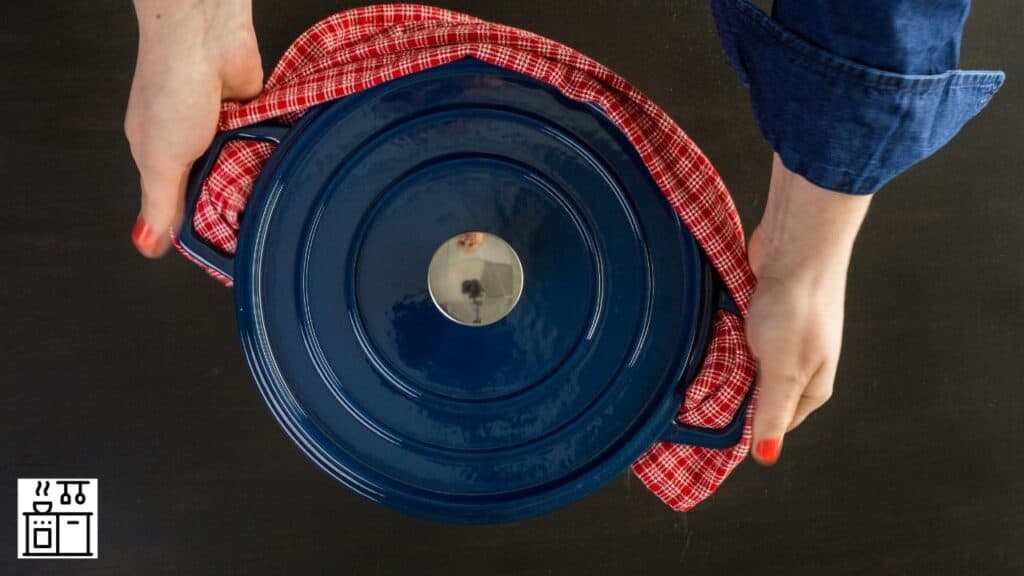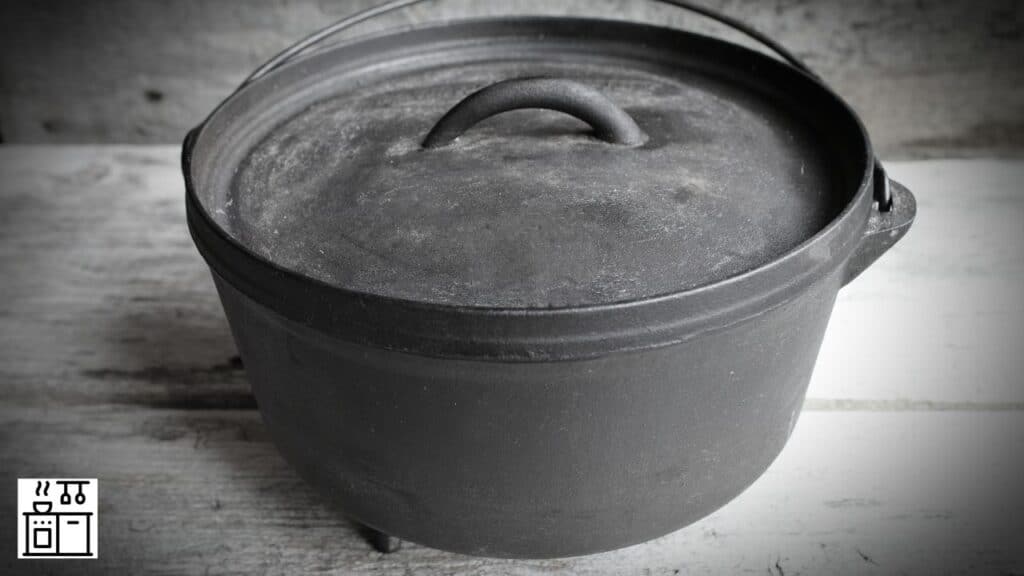Cast iron is extensively used in traditional cookware. Since Dutch ovens are some of the oldest types of cookware, are Dutch ovens made of cast iron?
Yes, original Dutch ovens were made of cast iron. Even today, cast iron is used for Dutch ovens. However, Dutch ovens are now also made up of aluminum, enameled cast iron, ceramic, stainless steel, and other materials. Cast iron is usually used in Dutch ovens due to its practicality and usability.
Let’s delve deeper into this now.
What Are Dutch Ovens Made Of?
Dutch ovens have been a staple in household kitchens for decades.
They are very functional and highly versatile cookware.
More importantly, good Dutch ovens last for decades.
Classic pieces are even passed down from one generation to the next as heirloom pieces.
Now, original Dutch ovens were large, deep pots forged from cast iron.
They came with handles on both sides and a tight-fitting lid.
Traditional Dutch ovens came with legs because they were used for cooking on open flames.
The legs lifted them above the burning coals.
The distinctive feature of these deep pots is their thick walls and lids that lock the moisture in.
They help to retain the delicious flavors of the ingredients.
The base also allows slow but even heat distribution and thorough cooking.
Once cooking shifted from open flames and kilns to stovetops and electric or gas ovens, the legs also disappeared from Dutch ovens.
However, the rest of the design remained the same.
A few brands continue to make Dutch ovens with legs.
They are useful for campers who cook food over open flames.
Although cast iron was the default choice for traditional Dutch ovens, it was not suitable for everyone.
With the change in cooking methods over the years, Dutch oven designs have also changed to satisfy different needs.
Cookware manufacturers use different materials in new Dutch oven designs.
You can also find them in different sizes, looks, and material finishes at different price points.
Recommended Further Reading:
- Understanding the Functioning of Dutch Ovens
- Can Dutch Ovens be Used in the Oven?
- Is a Dutch Oven Safe to Put in the Dishwasher?
Are All Dutch Ovens Cast Iron?
Cast iron continues to be widely preferred for constructing Dutch ovens.
However, it’s not the only metal used for their construction.
Apart from cast iron, you will come across enameled cast iron, aluminum, ceramic, stainless steel, and cast aluminum Dutch ovens.
Each of these materials has its pros and cons.
Some are lighter than cast iron, easier to clean and maintain, and less expensive.
Nonetheless, the common factor is the shape of the Dutch oven and its use.
All Dutch ovens are wide pots with handles and airtight lids by default.
How To Choose The Right Material For Your Dutch Oven?
Dutch ovens are generally expensive.
So it’s wise to understand your options and choose one that ideally suits your needs.
When you buy a good Dutch oven, it will serve you for years.
You can use it to prepare numerous dishes and use it for different cooking methods.
One of the main factors to consider is the material used to construct the Dutch oven.
Based on your cooking preferences, you can compare different materials and choose the one that works best for you.
Other important factors include the size of the Dutch oven, aesthetic quality, and, most importantly, cost.
Let’s now look at the different materials used to make Dutch ovens in closer detail.
We shall also discuss the pros and cons of each material to help you make an informed choice.
1. Cast Iron
Traditionally, Dutch ovens were made entirely of cast iron because of the rugged nature of this metal.
It’s tough, durable, and heatproof.
Cast iron heats evenly and thoroughly.
It’s very heavy, which means that the food will brown nicely and the pot will retain heat.
However, it’s very important to season cast iron.
Seasoning means applying a layer of oil to the surface of the metal to seal the gaps in it.
This will protect the metal base and prevent moisture from making it rust.
Seasoned cast iron is naturally non-stick, which makes it very useful.
However, cast iron is sensitive to moisture and rusts easily. It’s not dishwasher-friendly.
You must take special care to maintain the layer of seasoning by not scrubbing the surface with abrasive cleaners or using harsh detergents.
Additionally, cast iron is heavy and bulky. It’s difficult to handle.
You will have trouble picking it up and moving it around if you can’t lift heavy cookware.
Since it’s bulky and difficult to handle, it’s risky to use cast iron Dutch ovens on induction and glass stovetops.
If you accidentally drop or drag the Dutch ovens on this surface, it can develop scratches or even break.
Cast iron Dutch ovens are the best choice for campers. You can also use cast iron Dutch ovens in the oven.
2. Enameled Cast Iron

Enameled cast iron Dutch ovens are the upgraded version of traditional Dutch ovens.
These pots have an enamel coating over a cast iron base.
This coating is non-stick and doesn’t need any extra seasoning.
Food doesn’t stick to the surface of enameled cast iron Dutch ovens.
They look beautiful and are easy to clean and maintain.
However, these Dutch ovens are often more expensive than plain cast iron Dutch ovens.
Related Further Reading:
- Are Dutch Ovens Worth It? [Limitations Of Dutch Ovens]
- Is it Possible to Recycle Pots and Pans?
- Are Dutch Ovens Non-Stick? [Cast Iron, Enameled, Le Creuset, Etc.]
3. Stainless Steel Dutch Ovens
Stainless steel Dutch ovens are lighter than cast iron Dutch ovens. They can withstand high temperatures.
However, their base isn’t very thick, and they tend to heat up faster than cast iron.
One of the main benefits of stainless steel Dutch ovens is that they are easy to clean.
The metal surface will not rust.
Most stainless steel cookware is dishwasher friendly.
They are also better suited for delicate cooktops because of their light weight.
4. Ceramic
Ceramic Dutch ovens are non-stick. So food slides off the surface easily.
These Dutch ovens are heavy, but not as heavy as cast iron.
You can use ceramic Dutch ovens on the stove and in ovens.
They usually look beautiful and are easy to clean and maintain.
Ceramic cookware is usually dishwasher-friendly.
Nonetheless, you may like to check the manufacturer’s instructions before placing them in a dishwasher.
5. Aluminum
Aluminum Dutch ovens are usually very affordable.
They are lightweight and perfect for people who can’t carry heavy cookware.
These Dutch ovens heat up quickly and evenly.
However, their heat retention capacity is not as good as cast iron or ceramic.
Aluminum Dutch ovens will sometimes have a non-stick coating that makes it easy for food to slide off the surface.
It’s usually easy to clean. However, it’s highly unlikely that it will be dishwasher-safe.
You may have to handwash your Aluminum Dutch oven to retain its luster and prevent it from developing pits.
6. Cast Aluminum
Cast aluminum Dutch ovens are an upgraded version of regular aluminum Dutch ovens.
This cookware has a non-stick coating that makes it easy to cook food.
The main benefit of a cast aluminum Dutch oven is that they are lightweight.
Despite being lightweight, they offer better performance than aluminum Dutch ovens.
They are easy to clean and maintain too. They also look great and come in beautiful colors.
Are Lodge Dutch Ovens Cast Iron?
Lodge is a trusted brand for Dutch ovens.
This company offers a wide range of Dutch ovens in different sizes and price ranges to suit all types of needs.
All the Dutch ovens from Lodge are made of cast iron. They boast of high quality and feature the traditional greyish-black cast iron finish.
You can find Dutch ovens for stovetop use as well as camping needs in their collection.
Interestingly, some Lodge Dutch ovens have lids that multi-task as cast iron skillets.
Another attractive factor about Lodge Dutch ovens is that they are not as expensive as Le Creuset or Staub, making them a better choice if you are on a budget.
Are Le Creuset Dutch Ovens Cast Iron?
Le Creuset Dutch ovens are renowned for their timeless appeal and iconic colors.
They are considered high-end Dutch ovens because of their beautiful design details.
These Dutch ovens are expertly crafted from high-quality enameled cast iron and have beautiful creamy white interiors.
The thick base and walls make it suitable for slow-cooking, braising, baking, frying, and other cooking methods.
This cookware can seamlessly go from stovetop to oven to the table.
Interesting Further Reading:
- Can Pots Be Washed in the Dishwasher?
- What Are Strainers Used For? Which One Should You Get?
- Is It Safe to Wash Non-Stick Pans in the Dishwasher?
Are Staub Dutch Ovens Cast Iron?
Staub Dutch ovens are made of high-quality enamel cast iron and are excellent investment pieces. They have tight-fitting lids that prevent flavors from escaping.
These Dutch ovens are wide. They have thick walls and a heavy base that allows for thorough and even cooking of food.
The interior enamel of Staub Dutch ovens is dark grey.
The surface is porous. Although it can resist moisture to a certain extent, be careful when cleaning and storing it.
Exposure to moisture and humid conditions can make Staub Dutch ovens rust.
Like all Dutch ovens made of cast iron, this cookware is not dishwasher-friendly.

